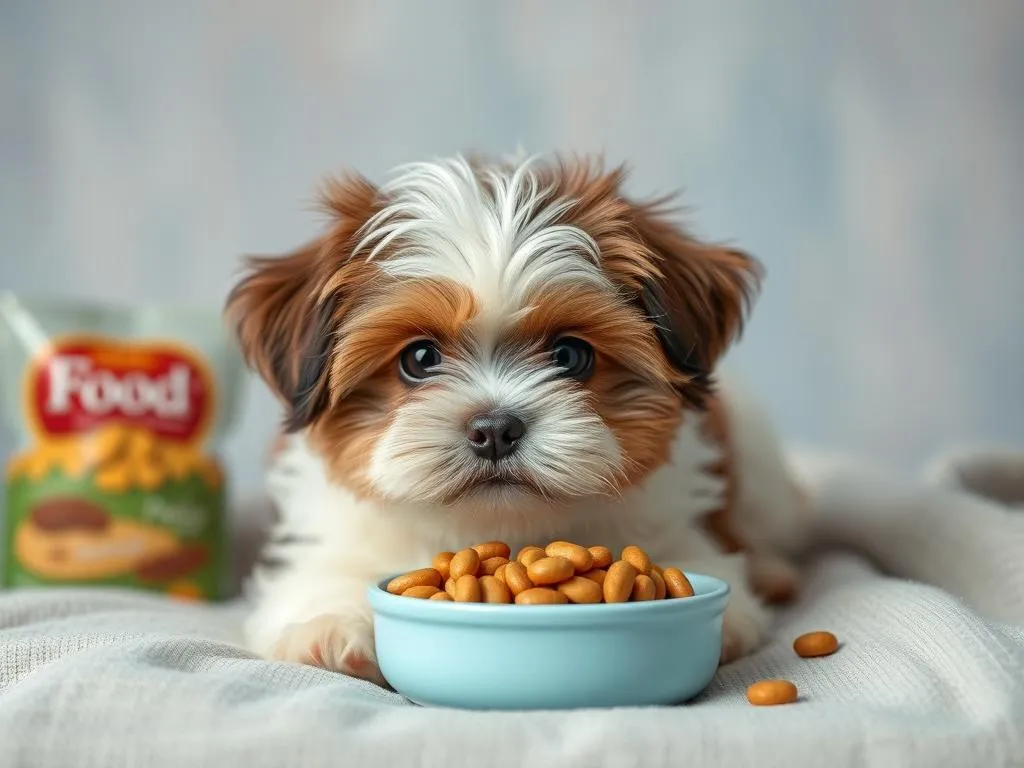
Introduction
Shih Poos, a delightful mix between Shih Tzus and Poodles, are small, affectionate dogs known for their charming personalities and fluffy coats. Like any breed, best dog foods for Shih Poos are crucial to their overall health and well-being. Proper nutrition is foundational for their growth, energy levels, and longevity. In this article, we will explore the nutritional needs specific to Shih Poos, factors to consider when choosing dog food, and our top recommendations for the best dog foods on the market.
Understanding the Nutritional Needs of Shih Poos
Basic Nutritional Requirements
Shih Poos, like all dogs, require a balanced diet that includes macronutrients: proteins, fats, and carbohydrates. Each of these plays a vital role in their health:
- Proteins: Essential for growth, maintenance, and repair of body tissues. High-quality animal proteins should be the primary ingredient in any dog food.
- Fats: Necessary for energy and supporting skin and coat health. Omega fatty acids are particularly beneficial for maintaining a shiny coat and healthy skin.
- Carbohydrates: Provide energy and aid in digestive health. Whole grains and vegetables can be excellent sources of digestible carbohydrates.
Vitamins and minerals are equally important for Shih Poos. Nutrients such as calcium, phosphorus, and vitamin E help support bone health, immune function, and overall well-being. The recommended caloric intake for Shih Poos varies by age and activity level, typically ranging from 300 to 600 calories per day.
Specific Health Considerations for Shih Poos
Shih Poos are prone to certain health issues that can be managed through proper nutrition. Some common health concerns include:
- Allergies: Many Shih Poos can develop food allergies. Choosing hypoallergenic dog food may help alleviate symptoms.
- Obesity: Small breeds often overeat, leading to obesity, which can exacerbate other health issues. A balanced diet and portion control are essential.
- Dental Problems: Shih Poos are susceptible to dental issues. Foods that promote dental health can be beneficial.
Nutrition plays a significant role in mitigating these concerns, making it vital to select the best dog foods for Shih Poos.
Factors to Consider When Choosing Dog Food
Life Stage
Shih Poos have different dietary needs depending on their life stage:
- Puppies: Require higher protein and fat levels to support rapid growth and development. Look for puppy-specific formulas rich in DHA for brain development.
- Adults: Need maintenance diets that provide a balanced ratio of nutrients to sustain their energy and health.
- Seniors: Should consume food with lower calories and added joint-support ingredients like glucosamine.
Ingredient Quality
Choosing high-quality ingredients is crucial for your Shih Poo’s health. Here’s how to assess ingredient quality:
- Read Dog Food Labels: Look for named animal proteins (like chicken or beef) as the first ingredient. Avoid foods with vague terms like “meat meal.”
- Sourcing and Manufacturing: Research where the ingredients are sourced and how the food is manufactured. Transparency from brands can indicate quality.
Special Dietary Needs
Some Shih Poos may have special dietary needs, including:
- Grain-Free vs. Grain-Inclusive: Grain-free diets may be beneficial for dogs with allergies, while grain-inclusive diets can provide needed fiber and energy.
- Hypoallergenic Options: If your Shih Poo has a sensitive stomach, consider hypoallergenic foods that exclude common allergens.
- Nutritional Supplements: Omega fatty acids and probiotics can enhance health, especially for skin and digestive issues.
Top Dog Foods for Shih Poos
Dry Kibble Options
- Brand A: Royal Canin Shih Tzu Adult
- Features: Specifically formulated for Shih Tzus, promoting healthy skin and coat.
- Pros: Tailored kibble size; supports dental health.
- Cons: Higher price point.
-
Price: Approximately $50 for a 10 lb bag.
-
Brand B: Hill’s Science Diet Adult Small Paws
- Features: Contains high-quality protein and antioxidants for a healthy immune system.
- Pros: Good for weight management; easily digestible.
- Cons: Some dogs may prefer other flavors.
-
Price: Approximately $45 for a 15 lb bag.
-
Brand C: Blue Buffalo Life Protection Small Breed
- Features: Made with real meat and wholesome grains.
- Pros: Contains LifeSource Bits for added nutrients; no artificial preservatives.
- Cons: May cause digestive issues in some dogs.
- Price: Approximately $50 for a 15 lb bag.
Wet Food Options
- Brand D: Merrick Grain-Free Texas Beef & Sweet Potato
- Features: High in protein with real beef as the first ingredient.
- Pros: Grain-free; great taste for picky eaters.
- Cons: Can be more expensive than dry food.
-
Price: Approximately $30 for a case of 12 cans.
-
Brand E: Royal Canin Shih Tzu Adult Wet Dog Food
- Features: Specifically formulated for Shih Tzus, enhancing palatability.
- Pros: Easy to chew and digest; supports skin health.
- Cons: Limited availability in some areas.
-
Price: Approximately $40 for a case of 12 cans.
-
Brand F: Wellness CORE Grain-Free
- Features: Packed with protein and nutrients from whole foods.
- Pros: Grain-free; contains probiotics for digestive health.
- Cons: Some dogs may find it too rich.
- Price: Approximately $35 for a case of 12 cans.
Homemade Dog Food Recipes
Making homemade dog food can be a great way to ensure your Shih Poo receives all the nutrients they need. Here are a couple of simple recipes:
- Chicken and Rice
- Ingredients: 1 cup cooked chicken (shredded), 1/2 cup cooked brown rice, 1/4 cup peas and carrots.
-
Instructions: Mix all ingredients together and serve.
-
Beef and Sweet Potato
- Ingredients: 1 cup lean ground beef, 1/2 cup cooked sweet potato (mashed), 1/4 cup spinach (cooked).
- Instructions: Cook the beef thoroughly, mix in the sweet potato and spinach, and serve.
When preparing homemade meals, ensure they are nutritionally balanced by consulting with a veterinary nutritionist.
Grain-Free vs. Grain-Inclusive Options
Choosing between grain-free and grain-inclusive foods can be challenging. Here are the pros and cons of each:
- Grain-Free:
- Pros: May help dogs with grain allergies; often higher in protein.
-
Cons: Not necessarily better for all dogs; some studies suggest potential heart problems (DCM).
-
Grain-Inclusive:
- Pros: Provides dietary fiber; often more affordable.
- Cons: Some dogs may have grain sensitivities.
Based on your Shih Poo’s specific needs, you may choose either option.
Feeding Guidelines for Shih Poos
Portion Control
Determining the right portion size for your Shih Poo is vital. Typically, the feeding guidelines on dog food packaging provide a good starting point. A general rule of thumb is to feed adult Shih Poos around 1/2 to 1 cup of high-quality food daily, divided into two meals. Use a measuring cup for accuracy.
Feeding Frequency
Feeding schedules can vary by age:
- Puppies: Should be fed three to four times a day.
- Adults: Two meals per day is recommended.
- Seniors: May benefit from smaller, more frequent meals to aid digestion.
Watch for signs of overfeeding (excessive weight gain) and underfeeding (weight loss or lethargy).
Monitoring Your Dog’s Weight and Health
Regular veterinary check-ups are essential to monitor your Shih Poo’s weight and overall health. Keep an eye on their behavior and physical condition. If you notice changes in appetite, energy levels, or weight, consult your veterinarian.
Common Myths About Dog Nutrition
Grain-Free is Always Better
Many dog owners believe that grain-free diets are superior for all dogs. While they can benefit dogs with allergies, grains can be a good source of energy and fiber for many dogs. It’s essential to assess your Shih Poo’s individual needs rather than following trends.
All Human Foods Are Bad for Dogs
Not all human foods are harmful to dogs. Some safe options for Shih Poos include:
- Cooked chicken and turkey (without seasoning)
- Carrots and green beans
- Apples (remove seeds)
However, it’s crucial to avoid foods toxic to dogs, such as chocolate, onions, and grapes.
Conclusion
Choosing the best dog foods for Shih Poos is an essential part of ensuring your furry friend lives a long, healthy, and happy life. By understanding their unique nutritional requirements and considering factors such as life stage, ingredient quality, and special dietary needs, you can make informed decisions about their diet. Regular consultations with a veterinarian will further enhance your Shih Poo’s health and well-being. Good nutrition not only affects their physical health but also their energy levels and mood, leading to a more vibrant life for your beloved companion.









